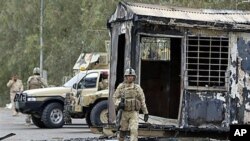The U.N.’s top envoy for Iraq is asking Baghdad not to close a camp for Iranian dissidents by the end of this year. Martin Kobler told the U.N. Security Council Tuesday that the United Nations is working with the residents of Camp Ashraf and the Iraqi government to find a solution for resettling the camp’s 3,000 residents, but will not resolve the issue before the December 31 deadline.
Kobler took up his duties in Iraq in August. In his first briefing to the Security Council on Tuesday, he said the Camp Ashraf issue is a matter of great concern and that many obstacles still remain before a plan is agreed upon that will satisfy both sides.
"Clearly the situation cannot be fully resolved before December 31. I, therefore, appeal to government of Iraq to extend this deadline in order to permit adequate time and space for a solution to be found. I also appeal to leadership and residents of Camp Ashraf to engage constructively and with an open mind to this process. They should give serious consideration to the proposals under discussion,” said Kobler.
Iraq has said it will close the camp on December 31 and then transfer the residents to other locations inside Iraq until they can be resettled in third countries where some hold dual nationality or return to Iran under an amnesty. Others may be allowed to stay in Iraq if they qualify for refugee status.
Many of the residents of Camp Ashraf have lived in Iraq for decades. It is a base of the People's Mujahedeen Organization of Iran, a group the United States says is a terrorist organization.
Former Iraqi leader Saddam Hussein, who fought a long and bloody war with Iran in the 1980s, gave Ashraf residents safe haven. The group often launched attacks on Iran from their base in eastern Iraq before Saddam’s ouster in 2003.
After the U.S.-led invasion, the United States oversaw the camp, but in 2009 transferred control to Iraq’s Shiite-led government, which sees the camp’s residents as a threat to national security.
Iraq’s U.N. ambassador Hamid al-Bayati told the Security Council that it cannot allow any group inside Iraq that attacks neighboring countries, and he urged those camp residents with dual nationalities to resettle in those countries.
“I would like to assure the Security Council that my government does not want to force anybody to go back to Iran. On the other hand, we believe that around 900 of the residents hold dual nationalities and we encourage them very much to go back to the countries they hold the nationality of,” said al-Bayati.
Last month, European Union foreign policy chief Catherine Ashton said she would urge EU member states to accept residents of the camp.
UN Urges Iraq Not to Close Iranian Dissident Camp















